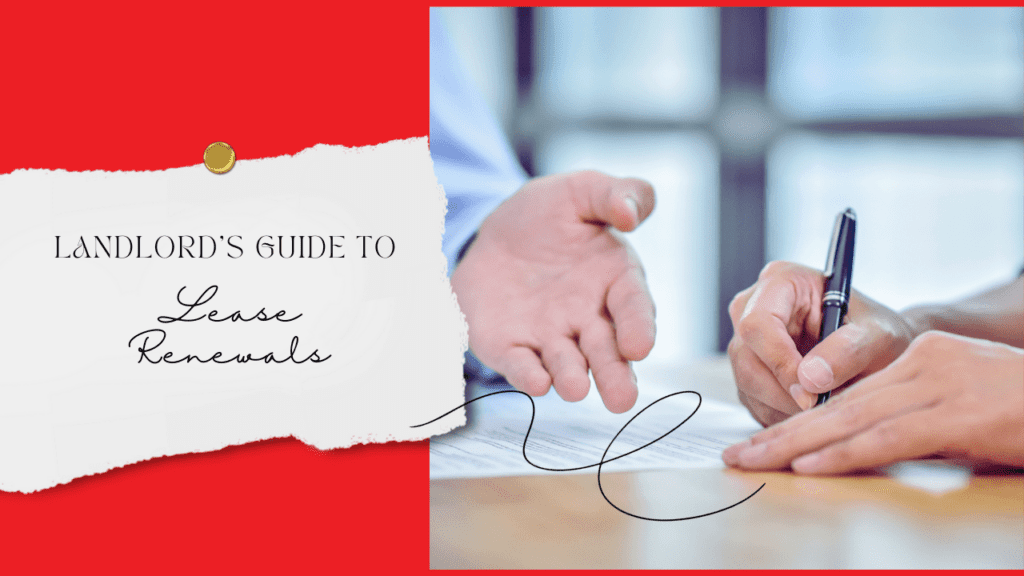
Encouraging lease renewals has to be an important part of your investment strategy. When you keep good residents in place, you spend less money on vacancy and turnover costs. Many of the landlords we work with are surprised at how much it costs to turn a property over between tenants. You could spend the equivalent of an entire month’s rent turning over your property. Sometimes, you’ll spend even more. There are maintenance costs, cosmetic repairs that must be made, and also the cleaning, landscaping, and marketing of that property as you prepare it for a new tenant. Appliances may have to be replaced. Floors may need to be torn out so new ones can be installed. There will be carpet cleaning and painting.
Avoiding those costs and holding onto your current tenant is almost always better.
Managing the lease renewal process can feel like a complex set of tasks for landlords, but managing it well is pivotal in tenant retention and investment success. A positive and effective renewal process will improve the relationship you currently have with your residents, especially if you express how much you’d like them to stay in your property. An efficient and successful renewal process will also increase what you earn on your investment.
While you want the lease renewal process to move quickly and efficiently, there are also some benefits to taking your time. Not only can you make necessary improvements and upgrades to your property, but it also provides you with the perfect opportunity to reflect on the quality of residents you’ve been attracting and the condition of your properties.
Let’s reduce the potential stress that can come with the lease renewal process and focus on how to ensure it goes right. We’re sharing our thoughts on managing a renewal process that can be the difference between a happy tenant signing a new lease and an expensive vacancy.
Get the Timing Right: Start Early
Check your existing lease agreement so you know when you should approach your tenant with a renewal offer. You’ll want to start the renewal process months before the current lease expires.
The best time to initiate the conversation is about three months out from the lease’s expiration date. This approach allows you ample time to strategize and decide on the most favorable offer for both you and the tenant. It also avoids any last-minute rushes. Your lease likely requires your residents to provide a specific amount of notice if they decide to move out. Don’t wait around for that Notice to Vacate; get ahead of that decision and give your residents a good reason to stay in place.
Communicate Early and Often with Residents
During the lease renewal process, communication is essential to ensuring everyone understands what’s happening. You don’t want tenants to just assume that the lease will renew at the same rental amount. You don’t want them to leave without notice.
Engaging with your residents by asking them about their plans for the future can help you understand what they want and what they need. Also, knowing their financial standing enables you to customize the lease agreement to best suit their needs as well as your own. We don’t typically re-screen our tenants when we’re renewing the lease. We have no idea if their income has gone down or if their credit has suffered a major setback in the last few months.
You’ll likely propose an increase in rent. Most tenants expect this, but you don’t want to shock them with the amount. Talk about their options. If they cannot commit to a lease renewal for 12 months at a higher rent, maybe you can talk them into nine months. If they are interested in staying in place at the same rental amount for longer, propose an 18-month lease.
There’s no way to read minds. Have a conversation about whether they want to stay and what they understand to be a reasonable rental increase. Make sure you have market data to support your new rental amount. Tenants will likely do their research, too, they’ll know when they’re getting a good deal.
Make your Renewal Offer
Once you’ve spoken to your tenants and taken a look at what market rents are for properties similar to yours in your neighborhood, make the offer. For most landlords, the lease renewal process boils down to negotiating a new agreement.
For many tenants, the renewal will depend on more than just money. The rental increase will matter, but so will your willingness to provide changes, cleanings, and upgrades that might motivate them to stay. Does a tenant want a new microwave or a more efficient dishwasher? Be willing to consider those requests. Maybe they think the exterior paint is looking faded and chipped. Offer to paint the house.
Work with tenants on what matters most to them. Making a few upgrades or updates in order to keep a tenant in place is much better than dealing with a vacancy and turnover; where you’d have to make those improvements anyway.
Sign the New Lease Agreement
 After discussing the lease’s terms and reaching an agreement on the new rental amount, the final step is to draft the lease. Ensure that you have a thorough and concise lease that covers all legal bases. Once everything is in order, send the lease renewal documents for signing. This can typically be done electronically.
After discussing the lease’s terms and reaching an agreement on the new rental amount, the final step is to draft the lease. Ensure that you have a thorough and concise lease that covers all legal bases. Once everything is in order, send the lease renewal documents for signing. This can typically be done electronically.
You can typically work off the existing lease you have. If you need a template, however, or you’re not sure where to find the best language for your lease renewal, reach out to a property manager for help.
Managing the lease renewal process does not have to be stressful, especially if you have a good relationship in place with your resident and an established process that’s easy to execute with plenty of time before the lease ends. This is an opportunity for landlords to build positive rental experiences with their tenants and to invest in those relationships.
Start the process early, understand your resident’s needs, make a fair offer, draft a thorough agreement, and maintain open communication. This will ensure a seamless and successful lease renewal process that will benefit both you and your tenant in the long term.
If you’re not sure how to move forward at renewal time, or you have questions on anything pertaining to property management in Tampa and the surrounding area, please contact us at Hoffman Realty.
